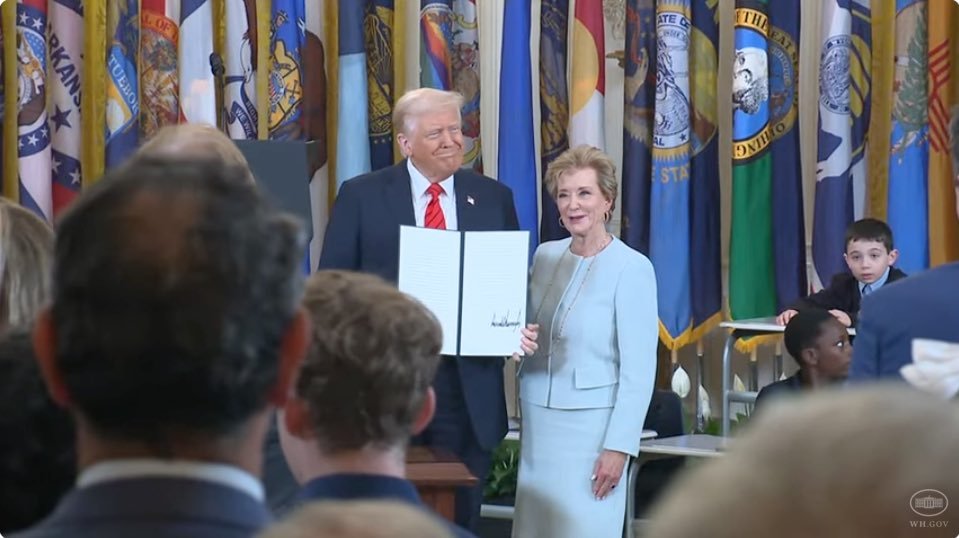Trump’s Plan to Eliminate U.S. Education Department Could Reshape Tennessee Schools, Lawmakers Say
Tennessee lawmakers convened the Joint Federal Education Deregulation Cooperation Task Force Tuesday morning to assess the impact of President Donald Trump’s proposal to dismantle the U.S. Department of Education.
The newly created seven-member task force, mandated by a new state law passed earlier this year, includes legislative leaders and a governor-appointed licensed educator. The group is tasked with identifying all sources of federal education funding, the conditions attached to those funds, and planning contingencies should the department be eliminated.
Where Federal Dollars Go
At today’s meeting, task force members outlined that federal funding in Tennessee supports five principal areas through Every Student Succeeds Act (ESSA), the Individuals with Disabilities Act (IDEA), and the United States Department of Agriculture (USDA).
1. Child nutrition (including the National School Lunch Program) through the USDA.
2. Support for economically disadvantaged students through ESSA Title I.
3. Improving teacher and principal quality through the ESSA Title II.
4. Support for arts, foreign language, and STEM (science, technology, engineering, and math) through the ESSA Title IV.
5. Support for students with disabilities through the IDEA.
The Comptroller’s office presented data from the 2023-24 school year on expenditures for these programs as follows: the total expenditures for child nutrition were at $463,030,664; $346665471.17 for Title I programs, $301,434,195.98 for IDEA, $47,016,953.31 for Title IV, and $40,699,555.32 for Title II.
Additionally, the committee cited Title V and Title IX as smaller, but still relevant funding streams.
Officials noted that these federal grants reach 971,741 students statewide and cover all 150 school districts. Additionally, 1,200 of Tennessee’s 1,926 public schools qualify as Title I schools under ESSA guidelines.
Representatives from the Tennessee Department of Education (TDOE) indicated that federal contributions comprise approximately 9.53 percent of Tennessee’s FY 2025 education budget, aligning with similar national estimates of 8–20 percent depending on the source.
The Case for Innovation
TDOE Commissioner Lizette Reynolds emphasized that dismantling the Department of Education presents an opportunity for Tennessee to innovate, align schooling more closely with state values, and reduce administrative burdens. She advocated for a shift to block grants, asserting they would streamline compliance requirements, cut paperwork, and enable more efficient resource deployment to support student needs.
“The federal government does not educate students,” said Commissioner Reynolds. “Local school districts do, and we provide the resources so that they can do that. With the federal government funding, if that comes down, there are streams that could be detached to allow us to ensure that our dollars are going directly towards what we believe is best for kids.”
Tennessee Democrats Oppose President Trump’s Plan
Republican leaders chose not to appoint any lawmakers from the Democratic party to the task force. President Trump’s plans for the U.S. Department of Education have largely been opposed by Democrats who argue it will ultimately end up taking money away from public education and harm economically disadvantaged students and those with special learning needs.
Tennessee Senate Democrats sent an email to the Tennessee Firefly Tuesday morning criticizing the task force make-up and goals.
“According to the agenda, the task force should include a “licensed educator” as a member, but that post is suspiciously still vacant before the task force’s first meeting,” said Senate Democrats in the email. “This task force is part of a larger Republican Party effort to destabilize public schools and privatize education. Tennessee already ranks 47th in the nation for per-pupil funding after 15 years of Republican budgets. In recent years, the GOP has enacted private school voucher scams and charter school reforms that divert public dollars away from traditional public schools to privately run institutions that don’t serve all children.”


